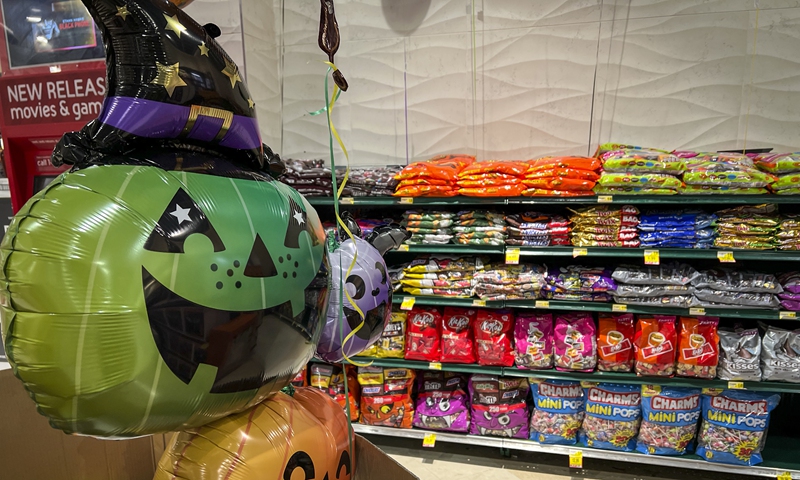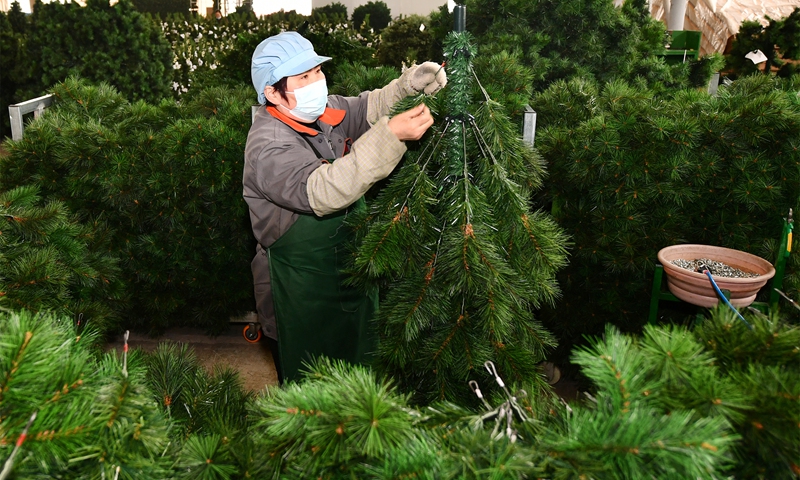
Halloween items are for sale at a Harris Teeter grocery store on October 17, 2022 in Washington DC, US. Photo: VCG
Chinese exporters have seen weak demand for festive products for coming Halloween, with orders down nearly 40 percent year-on-year.
However, Christmas consumption shows the opposite trend, as the festival is more commonly celebrated on a global level. Demand in Asia and South America, where the market is relatively resilient, is accounting for a bigger market share this year, the Global Times learned.
China's exporters, which are seen as a barometer of the world's consumption, are feeling the early impact from global inflation.
"This Halloween didn't liven up demand for some of the country's holiday products," a Ningbo-based trader surnamed Cheng in East China's Zhejiang Province told the Global Times on Wednesday.
Sales for Halloween this year were not what he expected, according to Cheng, who mostly sells to Europe and the US.
Orders this year are down 40 percent year-on-year as foreign clients digest goods left over from last year, "but high inflation that caused softer demand is the main reason," Cheng said.
Given the poor market response, some foreign clients are even hesitant to place orders for next year, the trader said.
A producer of Halloween items in Zhejiang's Jinhua told the Global Times that this year's Halloween sales has been lackluster, with orders from the US and Europe largely flat with last year.
Elevated inflation has led to higher commodity prices. US statistics authorities recently reported that Halloween candy prices are up 13.1 percent over last year, the largest yearly jump on record, National Public Radio reported.
However, industry insiders said that the most commonly celebrated festival, Christmas, has been resilient despite inflation.
Cai Qinliang, secretary-general of the Industry Association of Christmas Supplies in Yiwu, told the Global Times that orders for Christmas goods this year jumped 8-10 percent on average, with no substantive impact from inflation.
"Unlike Halloween, Christmas - as a must-spend festival - is clearly more powerful in terms of generating sales," Cai said.
Asian and South American markets have taken the lead in placing orders for Christmas, accounting for up to 70 percent of the total orders for Yiwu traders.

People make artificial Christmas trees for export at Huai'an Victory Plastic Production Co in Huai'sn, East China's Jiangsu Province, on March 23, 2022. China is a major exporter of artificial Christmas trees. For instance, 85 percent of the artificial Christmas trees in the US are imported from China, according to the US Commerce Department. Photo: VCG
Affected by the economic downturn, the global double holiday (Christmas and Black Friday) consumption tends to "buy high quality at a low price," and buyers pay more attention to creativity and customization, according to Alibaba.com.
An analysis by China's Ministry of Commerce suggested that foreign trade is facing some new uncertainties, as reflected in slower growth in major economies such as the US and Europe, according to media reports.
Still, from January to August, China's total foreign trade reached a new record of 27.3 trillion yuan ($3.8 trillion) backed by China's complete supply chain and competitive products.





